Meet the golf club owner: Penny Streeter OBE
Penny is one of the most interesting entrepreneurs in the world, let alone in golf in the UK. She made millions for one company before becoming homeless, before making millions for herself. Now she owns a Sussex golf club which will also be a winery. The Golf Business talks to her about her career and her plans for Mannings Heath Golf Club and Wine Estate
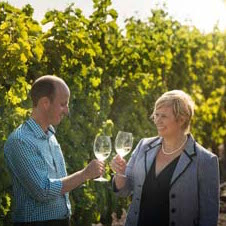
Penny Streeter OBE is the owner of the Benguela Collection vineyards and hospitality group. It includes the 400 acre Mannings Heath Golf Club and Wine Estate in West Sussex and the Benguela Cove vineyard in South Africa, as well as four restaurants and a hotel on the Garden Route.
Zimbabwe-born Streeter bought the golf site in 2016 and received immediate media interest when the club planted 38,000 vines, meaning it will become the first golf club in the UK to also be a winery.
Once a homeless divorcee with three children, she was awarded the OBE for ‘services to enterprise’ in 2006, and last month Penny acquired the Leonardslee Gardens Estate, with among the finest gardens in the UK. They attracted 50,000 visitors before they closed in 2010. The new owner plans to restore the gardens and its estate mansion and re-open it to the public in March 2018.
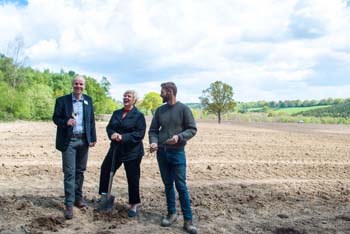
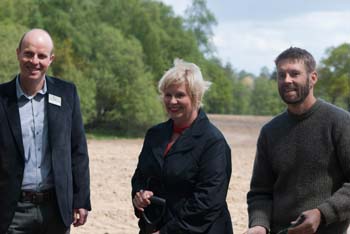
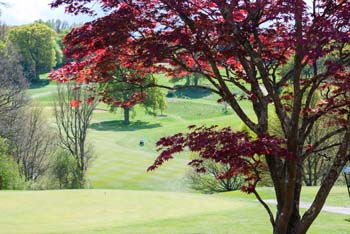
How did you get where you are today?
My life work-wise began at the age of 16 when I left school and, as one of Thatcher’s children, I decided to do a youth training scheme. After completing that I was placed in an office and began doing general secretarial work, which I didn’t really enjoy. So I decided to train as a beauty therapist. I qualified as a beautician and went about setting up my own business and for about a year I worked in rented spaces within hairdressers’ salons.
That was my first foray into running my own business, although it was very low profile. From there I decided that I would find a career that would pay more money; being self-employed wasn’t paying well. I walked into an employment agency and was interviewed by a consultant there who quite quickly told me: ‘Hey, I think you’ve got all the skills to work in our industry’. They recommended me for a job at their own recruitment agency and the next day I was working as a recruitment consultant.
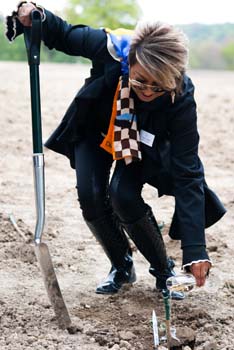
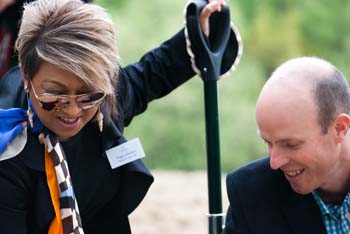
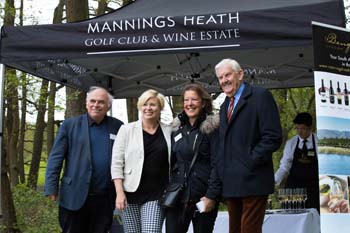
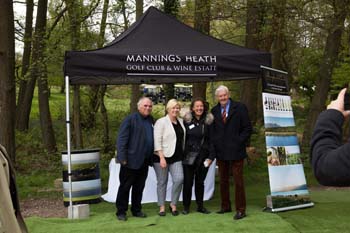
How did your first attempt in recruitment go?
I absolutely loved the job and found I was very good at it. I felt like I had found my niche. My mum joined the business as well and between us we ran two branch offices. Both branches were part of someone else’s business and each branch would compete with the other. We were highly successful, in fact so successful that we were earning a significant commission and the owner effectively said to us that we could be replaced with cheaper staff, which is what he did. That was the catalyst for us to set up our own business, with another employee who worked for the recruitment agency, which was called Elite Personnel.
Elite Personnel was a general recruitment agency that started in around 1988/89. We had no money of our own but both my mum and our colleague Sue were able to borrow from the bank. As I recall, they each borrowed £8,000, so we had £16,000 pounds worth of capital. We thought we were going to make millions because we literally had been making millions when working for our previous employer.
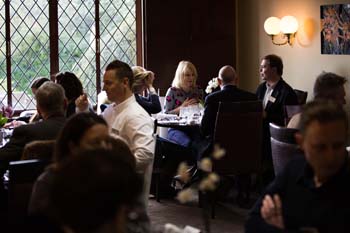
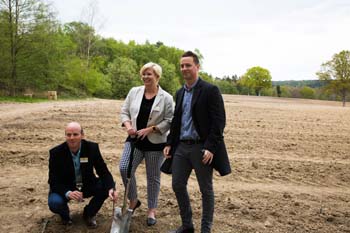
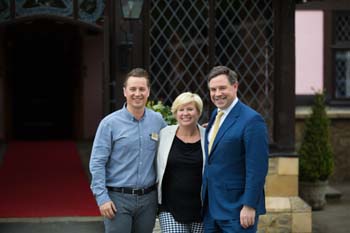
And did it go according to plan?
The recession of 1989 hit and the reverse happened; we had no jobs and hundreds of fantastic candidates looking for work. As recruitment works on the basis of a shortage of candidates it was a complete disaster. So to supplement our income we set up Elite Diners which was a singles dining club for people over the age of 30 that wanted to meet and greet in convivial environments.
It was actually very popular and grew to around 400 members but it was extremely hard work and time consuming. We had to eat out every night; we had problems of matching equal numbers of men to women but over time we came to the realisation that neither Elite Diners nor Elite Personnel were going anywhere and we decided to call it a day.
We closed down the business with quite significant debt and it was a dreadful time because whilst I didn’t personally have any guarantees on the business, the other two had debt collectors and bailiffs going after them. My car was repossessed. It was a really horrible time.
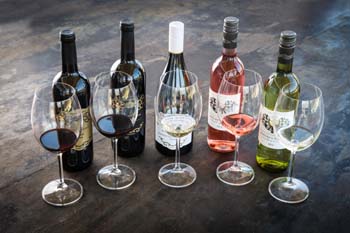
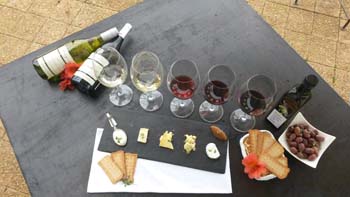
How did you recover?
I wasn’t sure where to go from there so my next step was to run away from it all. So I took my two children and my husband and moved to Johannesburg, South Africa to help my sister run a cabaret restaurant called Stars Cabaret Restaurant. We were hands-on, helping run the business which was tough as the cabaret restaurant was open until very late at night. But I did enjoy the experience. Other than working in a pub once, I didn’t have any hospitality expertise so this gave me a good introduction.
I fell pregnant with my third child Bonnie whilst I was there and unfortunately my daughter Gisele became sick and caught meningitis. Due to the pregnancy, the sick child and my marriage breaking down I decided enough is enough and decided to return home to the UK.
I arrived with my children eight months pregnant and went into homeless accommodation. I was on benefits, I didn’t have anything and I didn’t know what to do. As a single parent I knew I had to get a job. Knowing I’d been most successful in recruitment, I decided that I’d actually like to set up my own recruitment business again, which my mother was not happy about! She didn’t think it was a good idea because we had no money, but soon we started organising children’s discos to fund our revival.
As children’s entertainers we worked every Saturday and Sunday. We would run two or three discos a day and that was how we managed to set up and refund our original business. A South African school friend lent me a corner of his office rent free to run our recruitment business. Every penny we earned on our discos went back into our business and we started to make placements quite quickly.
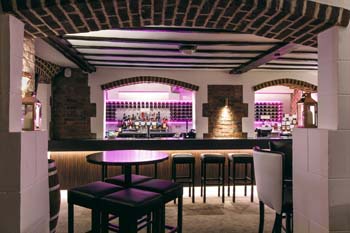
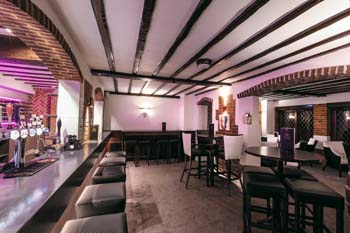
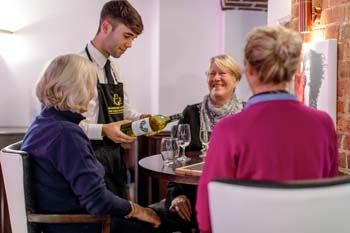
How was this recruitment company different?
We were in general recruitment but moved into the financial recruitment market. That proved successful and eventually we bought our own offices in Wallington, Sutton. Later we moved into healthcare recruitment where we discovered there was a huge demand for temporary staff.
We had previously been supplying permanent staff, but within the healthcare sector we realised that nursing homes and hospitals are 24/7 operations and that at the time recruitment businesses were all shutting at 5pm. We started meeting the demand and as a result the majority of our work was after 5pm. Ambition 24 Hours was born.
Ambition 24 Hours is a last-minute 24/7 medical staffing agency set up with the belief that hospitals should be able to get staff as and when they need them. They shouldn’t have to give excess notice to do so.
The business grew dramatically overnight and very quickly we had a large number of employees. In 2001 we were the fastest growing company in the UK and broke into the Fast Track 100 list. The business continued to grow and evolve and 21 years later it is still going strong. We make sure we’re constantly being innovative, looking at how we operate and making sure that we’re staying ahead of our competitors. Most importantly, making sure we’re still providing what our clients need.
After my daughter Tilly was born in 2001 we moved our operations to Cape Town. We set up our back office and commercial premises in Bellville in Cape Town and this, looking back, was a very important time for us. We managed to acquire a number of major UK healthcare providers as clients which we still support – and we also own two South African businesses, one of which we acquired in 2006.
My ethos has always been to invest in my businesses. Fear of failure still drives me. Any extra money I have I tend to want to invest wisely. I follow the old adage ‘if you can’t afford it you shouldn’t have it’ so I would always avoid leases, hire purchases, mortgages and so on.
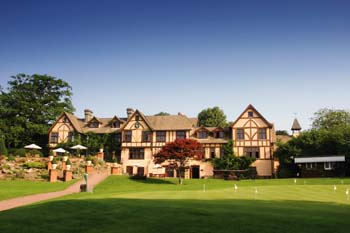
What else has happened since you moved to Cape Town?
I invested in more commercial buildings and started to build up my property portfolio. In 2013 I acquired Benguela Cove Lagoon Wine Estate in South Africa. It’s a 200 hectare farm consisting of 70 hectares of vineyards, 10 hectares of olive trees and five hectares of lavender fields. It’s situated overlooking a lagoon and the Atlantic. It truly is a magnificent place. What is special about it is it’s not only a vineyard and wine estate, it is also a major property development. So first and foremost the purchase of Benguela Cove was my move into full-time property development on a large scale.
Hand in hand with the property development are the commercial facilities that we are developing in a five hectare area. This is all a byproduct of what’s produced by the farm – the grapes. It’s like a small town. It has a 450 tonne winery, a very large restaurant that seats 100 people, a barrel room that seats 80 to 100 people, two large retail outlets and wine tasting facilities. We are also building an 18-hole adventure golf facility which will involve a lot of time and capital.
Further to that we have launched a small hotel on the Garden Route which obtained 5 star status and we operate a fine dining restaurant in Somerset West in the winelands. All of those properties we own.
By acquiring the hospitality side of the business – Benguela Cove, Lakeside Lodge and Benguela on Main – we had created what we term the Benguela Collection. It’s a collection of luxury high-end properties that deliver first class tourism experiences to individuals and groups. We retained the same ethos that we had in our staffing business: people deserve high levels of service, and hospitality is no different to recruitment in that respect.
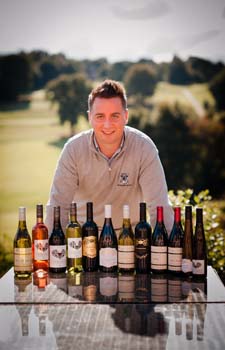
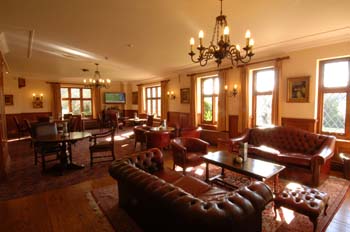
How did you become involved in the UK wine industry?
We heard about the growth of the UK wine industry particularly in Kent and Sussex which is said to have similar terroir and growing conditions to the Champagne region of France.
With that in mind we made our acquisition of Mannings Heath Golf Club in 2016. We wanted a property where we could plant a vineyard to make English sparkling wine and showcase our wine from our South African vineyards. Mannings Heath was perfect. Not only was it absolutely stunning like our other hospitality properties, it had all the facilities we needed. In our view South Africa is a leader in world wine tourism; we needed to bring that same experience to the UK. This would hopefully enable high levels of footfall to the estate to experience not only the vineyard, but wine tasting and other experiences.
Mannings Heath really ticked every box and gave us a further angle of golf. Initially this wasn’t something we were looking for but everything fitted together and it’s a superb situation. In July 2017 we acquired Leonardslee Gardens which will complement the Benguela Collection.


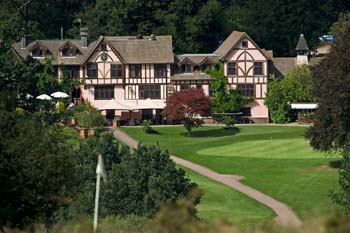
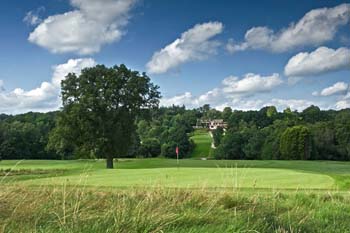
Tell us about the vineyard.
Well, we purchased Mannings Heath Golf Course with the intention of obtaining land adjacent or close by for the new vineyard. The golf captain at that time told me he felt that there would be huge demand for a nine-hole golf course; there was plenty of space and we should consider using part of the Kingfisher course for our vineyard. Hey presto, that’s what we did.
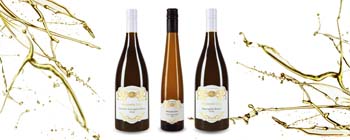
How did you know it was a good location for viticulture?
Large wineries such as Taittinger and Mumm have moved into the local area and sparkling wines from the Kent and Sussex region have won first class awards in France. In a blind tasting the French themselves couldn’t distinguish between the English wines and the French wines. That means that our environment and growing conditions are absolutely perfect.
We got in touch with viticulturist Duncan McNeill. Duncan came and looked at the land, looked at the slopes, tested the soil and came back with the great news: the land was perfect and our winemaker agreed. In April this year we planted our vineyard. We’re planting in in two tranches – and the winemaker tells me that’s just to be cautious. It won’t make any difference to the growing time, as it will catch up with itself. He wants to see if the cultivars he’s planted thrive and whether to make any changes for the second planting, which is next year.
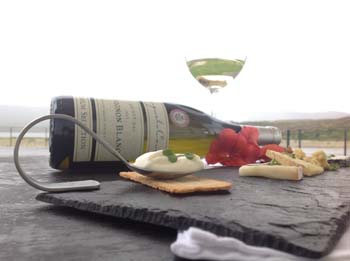
What grapes will you be planting?
We’ve planted Pinot Meunier, Chardonnay and Pinot Noir – the three cultivars required to make Sussex sparkling wine. We are thinking in terms of House of Mannings Heath and House of Leonardslee as brands. The first vines planted are thriving in the environment and in four years’ time we’ll have our first crop.
We are putting together plans to obtain planning consent for a winery next to our greenkeeper sheds. That way we have somewhere to produce sparkling wines on site. We know from our South African vineyard that the fruit should not be moved too far from where it’s grown; having our own winery gives us total control of what ends up in the glass.
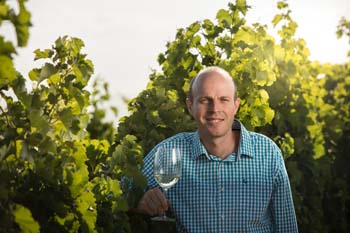

How does the wine dovetail with golf?
I think they’re natural bedfellows. Golf is a sport in an exceedingly social environment. Wine, we are hoping, will help Mannings Heath to attract more members by changing the way golf is viewed. How it’s perceived by non-playing women and younger people for example. Perhaps attracting them into the club for the first time for wine tastings or to have a tour of the vineyard. In turn this will encourage them to try out the sport. Golf clubs are often seen as inaccessible so by opening up them up we can break down those preconceived notions.
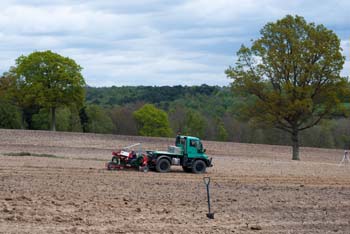
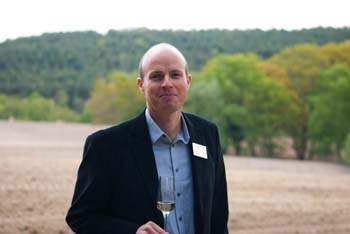
Are you marketing the wine beyond the club? How?
Yes, absolutely, we’re marketing the wine globally. The first task for any vineyard or winery is to make sure that you have a first class visitor experience at your individual properties and with Mannings Heath we’ve done that. We’ve got great wine tastings, other events and leisure facilities. Anyone visiting the club can buy our wines at cellar door prices directly from the winery.
Additionally, we’re about to launch our Benguela Cove wine club. Now that our winery in South Africa is ready, our winemaker will make our own special edition wines that aren’t available anywhere else. That’s quite exciting. We’ve recruited a global sales force who are responsible for partnering with hospitality and entertainment businesses. We are still a young business but watch this space!
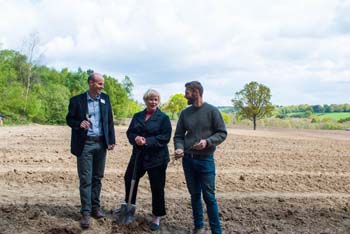
How far advanced is your business plan? How far are you planning ahead and what’s next?
I never operate on a rigid business plan; I always have an eye to the future and look for opportunities to drive my business forward. For example at Mannings Heath we’ve gained many new connections through our golfers and also through our South African properties. People come from South Africa to visit us which is absolutely fantastic and wasn’t something we were expecting. But just like with any business, we have to look at what we can do better and what we can introduce. Speaking to customers and members is so important.
This month we’re hosting the 10th stage of the PGA EuroPro Tour and a PGA EuroPro Pro-Am event. We’re looking at holding other major competitions at Mannings. In July we acquired Leonardslee Gardens, only three miles from Mannings Heath, which we plan to restore to its former glory and re-open to the public in March next year. One year down the line and we are moving rapidly.
What is your biggest challenge now?
The biggest challenge for me is time. I run a number of key businesses and operations and I would like to spend more time with each and every one of them. The biggest challenge for Mannings Heath is to make sure that we continue to evolve, to look at what we’re doing and how we can do it better. I speak daily with our management team on the ground and we’re working hard to push the business forward. The diversity of the two businesses, that is golf and wine, whilst being great bedfellows does also bring challenges.
How would you categorise the golf members and membership?
There are five different types of membership. Full membership gives golfers unlimited access to both the 18 hole Waterfall course and the Kingfisher nine-hole course. Full members also get discounts through the club, free wine tasting experiences and the option to play during member priority times.
Kingfisher members have unlimited use of the Kingfisher course and receive a discount to the Waterfall. They can also compete in Kingfisher club competitions, aimed at golfers that want to improve and socialise. Academy membership gives unlimited use of the Kingfisher and monthly group clinics with our PGA professionals. Players of all ages and ability are encouraged to join the Academy. We have a junior membership available to 12 to 17 year olds that gives youngsters the chance to compete in junior competitions and some of the club competitions. And we have a Country membership for players from other clubs.
How do you plan to develop the membership?
By putting together different packages and looking at how we can market to different people. I would personally like to see more groups of women and youngsters. Our nine-hole course is very attractive to new players, it has a good mix of shots, and players can complete the course in roughly 90 minutes. Hopefully golfers will play often enough to want to become full members and play on the Waterfall course.
Mannings Heath is now promoting a regular Wednesday roll up on the Kingfisher course, open to both visitors and members. Players can arrive between 5pm and 6.30pm. Green fees are £9 for visitors, which includes entry to a weekly competition. The format of the competition will change regularly to keep it interesting.
How are you encouraging junior members?
Let’s face it, golf can be a bit off-putting culturally for younger people, so we’ve got to break down these barriers. Younger adults in the 18 to 30 age group are getting married, work long hours and are very short of free time. The nine-hole format may be more appealing to them. We are looking for opportunities to work with schools and youth clubs and we will also be planning golf open days.
What wines and events are available? How do they complement the food at the club?
It’s still early days and we are looking to hold more wine events. In South Africa we hold a range of wine themed events and our corporate wine tastings have been very popular. This is a tasting of five wines, chosen by the taster and the session guided by one of our wine tasting ambassadors. We charge £5 which is refundable against any purchases over £15, so they get the cost back.
Mannings Heath hosts chocolate and wine pairing events; handcrafted artisan chocolates specifically paired to complement our wines. We also do cheese and wine pairings with local Sussex cheeses carefully paired to complement our wines. Our master wine pairings are also popular.
Any final thoughts on the future of English golf, with your commercial experience?
The future is assured only if clubs innovate and understand what will attract new golfers and encourage them to stay as members. You can’t stand still, you have to be continually innovating, to produce a better quality experience. Quality is the key.
Again, combining golf and wine works especially well – and also organising barbecues, dining and music events – to bring in partners and children who would not otherwise step foot in a club. Mannings Heath is such a beautiful setting, it is a great asset, so we can offer a really wonderful experience, for players and their families alike.















amazing story, i learn a lot from your story
“If you can’t afford it you shouldn’t have it!”
How wonderful to hear you are to open leonardslea again . We travelled from Essex many times to see all the rhododendrons, camellias etc etc and was so sorry when it closed. I wish you all the luck in the world with your projects and what a wonderful reading about your life . Well done.
“If you can’t afford it you shouldn’t have it!”
Exactly the theme that has made The Epping Golf Course successful we a zero capital start-up.
Very well done Penny!
It is an amazing story about Penny Streeter, cheers!
How interesting. We were looking to visit Leonardslee Gardens from our home in Brighton, then saw the link to Benguela Cove adjacent another home we have in Meerenbosch opposite the wine estate. A very small world. How well has Penny Streeter OBE done!